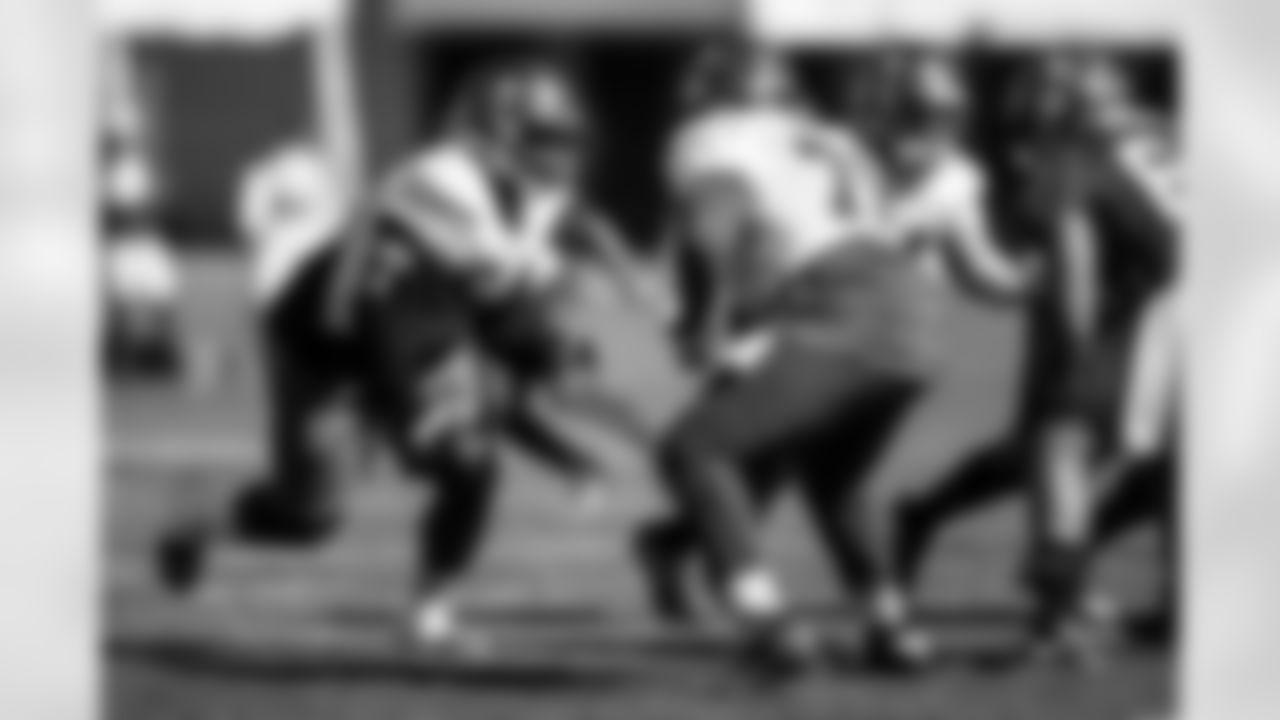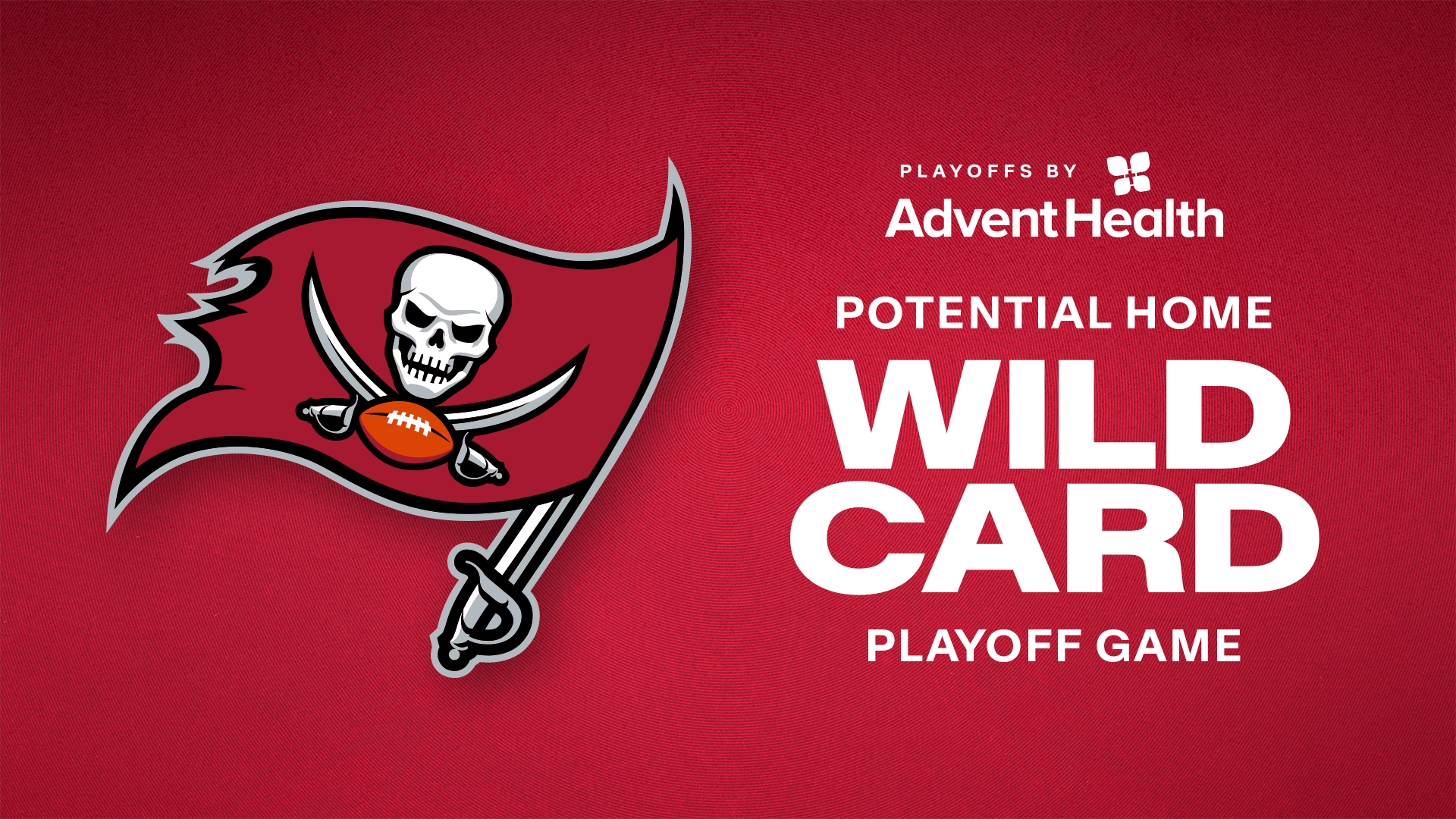The Tampa Bay Buccaneers made their long-awaited return to the playoffs in 2020, heading into the tournament as the NFC's fifth seed. The bracket looks a little different this year because the NFL added a seventh playoff team in each conference, the first expansion of the playoff field since 1990.
However, had the field stayed the same at six teams in each conference, nothing much would be different for the Buccaneers right now. The seventh-seeded Chicago Bears would be out and the second-seeded New Orleans Saints would be enjoying a bye week along with the Green Bay Packers, but the four teams in the middle would stay the same. The third seed among the four division winners would play the sixth seed, or the second Wild Card team. The fourth seed among the four division winners would play the fifth seed, or the top Wild Card team.
So the Buccaneers would still be playing at the Washington Football Team while the Los Angeles Rams would still be playing at the Seattle Seahawks. What that means is that we have nearly two decades of comparable playoff arrangements to look back upon to see how fifth seeds have historically performed against fourth seeds.
While the NFL expanded the playoffs from five to six teams per conference in 1990, the league remained in arrangement of three divisions per conference. That meant three division winners and three Wild Card teams, which in turn meant the game between the fourth and fifth seeds was between two Wild Card teams. As such, the fourth seed always had either a better record than the fifth seed or the same record with a better tiebreaker. It was not possible to have what we have this year, with the 11-5 Buccaneers playing on the road at the 7-9 Washington Football Team.
That changed in 2002 when the Houston Texans came on as the 32nd team, allowing for a sensible realignment to four four-team divisions in each conference. And that meant the six-team playoff fields would now consistent of four division winners and two Wild Card teams. That's when the 4th-5th seed game became the lowest-seeded division winner against the top-seeded Wild Card. That gives us 18 seasons (2002-19) to peruse for date on those 4th-5th seed matchups. With two conferences, that's a total of 18 games.
So, how often do you think the lower-seeded Wild Card team "upset" the higher-seeded division-winning team at its own home? The answer is, pretty often. Of those 36 games, 15 were won by the Wild Card team, most recently with the Seattle Seahawks beating the Philadelphia Eagles in the first round last year. Seattle finished that season 11-5 but didn't win the West because the eventual conference champs, San Francisco, went 13-3. Philadelphia won the East with a 9-7 record.
That's not an uncommon situation among the 15 wins by fifth seeds in that span. Ten of those 15 teams came into the game with a better record than the fourth seed. They were able to overcome the home field advantage and continue into the second round. Four of those 15 fifth-seeded teams beat a fourth-seed that had a better record than they did, most recently when the 9-7 Tennessee Titans beat the 10-6 Kansas City Chiefs in 2017. That was the game in which Tennessee's Marcus Mariota completed a pass to himself and ran it in for a touchdown. Alex Smith was the Chiefs' quarterback in that game and he had a fine outing in a one-point loss.
All of this is pretty encouraging information for the Buccaneers. What is less encouraging is how those fifth seeds fared after their first-round win. Only three of those 15 teams also won in the second round. The gold standard and the example the Buccaneers would hope to duplicate is the 2007 New York Giants. They began the playoffs as the fifth seed in – I'm sorry to tell you this – Tampa and won, 24-14. The Giants then won in Dallas in the Divisional Round and Green Bay in the Conference Championship Game, which gave them a date against…Tom Brady's 18-0 New England Patriots in Super Bowl XLII. We all know what happened then.
Since all we care about right now is winning this one game and staying alive, let's consider the above information good news. Historically, the Buccaneers don't appear to be at too big of a disadvantage despite having to start the playoffs on the road.
Now on to your questions.
A reminder that you can send questions to me anytime you want on Twitter (@ScottSBucs) and they're easier to find if you include the hashtag #SSMailbagBucs. We are also now soliciting questions each week on our Instagram page; look for that story on Wednesdays. As always, if you want to get a longer question into the mailbag and would prefer to email your question, you can do so to tbbsocial@buccaneers.nfl.com.
View some of the top photos from Buccaneers Wild Card Week practice at the AdventHealth Training Center.

TAMPA, FL - JANUARY 06, 2021 - Quarterback Drew Stanton #6 of the Tampa Bay Buccaneers during practice at AdventHealth Training Center. Photo By Kyle Zedaker/Tampa Bay Buccaneers

TAMPA, FL - JANUARY 06, 2021 - Quarterback Tom Brady #12 of the Tampa Bay Buccaneers during practice at AdventHealth Training Center. Photo By Kyle Zedaker/Tampa Bay Buccaneers

TAMPA, FL - JANUARY 06, 2021 - Quarterback Tom Brady #12 of the Tampa Bay Buccaneers during practice at AdventHealth Training Center. Photo By Kyle Zedaker/Tampa Bay Buccaneers

TAMPA, FL - JANUARY 06, 2021 - Quarterback Drew Stanton #6 of the Tampa Bay Buccaneers during practice at AdventHealth Training Center. Photo By Kyle Zedaker/Tampa Bay Buccaneers

TAMPA, FL - JANUARY 06, 2021 - Tight End Rob Gronkowski #87 of the Tampa Bay Buccaneers during practice at AdventHealth Training Center. Photo By Kyle Zedaker/Tampa Bay Buccaneers

TAMPA, FL - JANUARY 06, 2021 - Tight End Rob Gronkowski #87 of the Tampa Bay Buccaneers during practice at AdventHealth Training Center. Photo By Kyle Zedaker/Tampa Bay Buccaneers

TAMPA, FL - JANUARY 06, 2021 - Quarterback Tom Brady #12 of the Tampa Bay Buccaneers during practice at AdventHealth Training Center. Photo By Kyle Zedaker/Tampa Bay Buccaneers

TAMPA, FL - JANUARY 06, 2021 - Quarterback Drew Stanton #6 of the Tampa Bay Buccaneers during practice at AdventHealth Training Center. Photo By Kyle Zedaker/Tampa Bay Buccaneers

TAMPA, FL - JANUARY 06, 2021 - \31 during practice at AdventHealth Training Center. Photo By Kyle Zedaker/Tampa Bay Buccaneers

TAMPA, FL - JANUARY 06, 2021 - Buccaneers flag during practice at AdventHealth Training Center. Photo By Kyle Zedaker/Tampa Bay Buccaneers

TAMPA, FL - JANUARY 06, 2021 - Wide Receiver Chris Godwin #14 of the Tampa Bay Buccaneers during practice at AdventHealth Training Center. Photo By Kyle Zedaker/Tampa Bay Buccaneers

TAMPA, FL - JANUARY 06, 2021 - Wide Receiver Chris Godwin #14 of the Tampa Bay Buccaneers during practice at AdventHealth Training Center. Photo By Kyle Zedaker/Tampa Bay Buccaneers

TAMPA, FL - JANUARY 06, 2021 - Tight Ends Coach Rick Christophel of the Tampa Bay Buccaneers during practice at AdventHealth Training Center. Photo By Kyle Zedaker/Tampa Bay Buccaneers

TAMPA, FL - JANUARY 06, 2021 - Running Back LeSean McCoy #25 of the Tampa Bay Buccaneers during practice at AdventHealth Training Center. Photo By Kyle Zedaker/Tampa Bay Buccaneers

TAMPA, FL - JANUARY 06, 2021 - Tight End Antony Auclair #82 of the Tampa Bay Buccaneers during practice at AdventHealth Training Center. Photo By Kyle Zedaker/Tampa Bay Buccaneers

TAMPA, FL - JANUARY 06, 2021 - Quarterback Ryan Griffin #4 of the Tampa Bay Buccaneers during practice at AdventHealth Training Center. Photo By Kyle Zedaker/Tampa Bay Buccaneers

TAMPA, FL - JANUARY 06, 2021 - Wide Receivers Coach Kevin Garver of the Tampa Bay Buccaneers during practice at AdventHealth Training Center. Photo By Kyle Zedaker/Tampa Bay Buccaneers

TAMPA, FL - JANUARY 06, 2021 - Wide Receiver Chris Godwin #14 of the Tampa Bay Buccaneers during practice at AdventHealth Training Center. Photo By Kyle Zedaker/Tampa Bay Buccaneers

TAMPA, FL - JANUARY 06, 2021 - Wide Receiver Scotty Miller #10 of the Tampa Bay Buccaneers during practice at AdventHealth Training Center. Photo By Kyle Zedaker/Tampa Bay Buccaneers

TAMPA, FL - JANUARY 06, 2021 - Wide Receiver Jaydon Mickens #85 of the Tampa Bay Buccaneers during practice at AdventHealth Training Center. Photo By Kyle Zedaker/Tampa Bay Buccaneers

TAMPA, FL - JANUARY 06, 2021 - Wide Receiver Chris Godwin #14 of the Tampa Bay Buccaneers during practice at AdventHealth Training Center. Photo By Kyle Zedaker/Tampa Bay Buccaneers

TAMPA, FL - JANUARY 06, 2021 - Wide Receiver Scotty Miller #10 of the Tampa Bay Buccaneers during practice at AdventHealth Training Center. Photo By Kyle Zedaker/Tampa Bay Buccaneers

TAMPA, FL - JANUARY 06, 2021 - Wide Receiver Tyler Johnson #18 of the Tampa Bay Buccaneers during practice at AdventHealth Training Center. Photo By Kyle Zedaker/Tampa Bay Buccaneers

TAMPA, FL - JANUARY 06, 2021 - Wide Receiver Antonio Brown #81 of the Tampa Bay Buccaneers during practice at AdventHealth Training Center. Photo By Kyle Zedaker/Tampa Bay Buccaneers

TAMPA, FL - JANUARY 06, 2021 - Wide Receiver Scotty Miller #10 of the Tampa Bay Buccaneers during practice at AdventHealth Training Center. Photo By Kyle Zedaker/Tampa Bay Buccaneers

TAMPA, FL - JANUARY 06, 2021 - Outside Linebacker Chapelle Russell #53 of the Tampa Bay Buccaneers during practice at AdventHealth Training Center. Photo By Kyle Zedaker/Tampa Bay Buccaneers

TAMPA, FL - JANUARY 06, 2021 - Defensive Coordinator Todd Bowles of the Tampa Bay Buccaneers during practice at AdventHealth Training Center. Photo By Kyle Zedaker/Tampa Bay Buccaneers

TAMPA, FL - JANUARY 06, 2021 - Inside Linebacker Kevin Minter #51 of the Tampa Bay Buccaneers during practice at AdventHealth Training Center. Photo By Kyle Zedaker/Tampa Bay Buccaneers

TAMPA, FL - JANUARY 06, 2021 - Wide Receiver Scotty Miller #10 of the Tampa Bay Buccaneers during practice at AdventHealth Training Center. Photo By Kyle Zedaker/Tampa Bay Buccaneers

TAMPA, FL - JANUARY 06, 2021 - Inside Linebacker Lavonte David #54 of the Tampa Bay Buccaneers during practice at AdventHealth Training Center. Photo By Kyle Zedaker/Tampa Bay Buccaneers

TAMPA, FL - JANUARY 06, 2021 - Wide Receiver Scotty Miller #10 of the Tampa Bay Buccaneers during practice at AdventHealth Training Center. Photo By Kyle Zedaker/Tampa Bay Buccaneers

TAMPA, FL - JANUARY 06, 2021 - Cornerback Carlton Davis #24 of the Tampa Bay Buccaneers during practice at AdventHealth Training Center. Photo By Kyle Zedaker/Tampa Bay Buccaneers

TAMPA, FL - JANUARY 06, 2021 - Tight End Cameron Brate #84 of the Tampa Bay Buccaneers during practice at AdventHealth Training Center. Photo By Kyle Zedaker/Tampa Bay Buccaneers

TAMPA, FL - JANUARY 06, 2021 - Cornerback Herb Miller #36 and Cornerback Ross Cockrell #43 of the Tampa Bay Buccaneers during practice at AdventHealth Training Center. Photo By Kyle Zedaker/Tampa Bay Buccaneers

TAMPA, FL - JANUARY 06, 2021 - Defensive Tackle Rakeem Nunez-Roches #56 of the Tampa Bay Buccaneers during practice at AdventHealth Training Center. Photo By Kyle Zedaker/Tampa Bay Buccaneers

TAMPA, FL - JANUARY 06, 2021 - Safety Jordan Whitehead #33 of the Tampa Bay Buccaneers during practice at AdventHealth Training Center. Photo By Kyle Zedaker/Tampa Bay Buccaneers

TAMPA, FL - JANUARY 06, 2021 - Safety Jordan Whitehead #33 of the Tampa Bay Buccaneers during practice at AdventHealth Training Center. Photo By Kyle Zedaker/Tampa Bay Buccaneers

TAMPA, FL - JANUARY 06, 2021 - Inside Linebacker Lavonte David #54 of the Tampa Bay Buccaneers during practice at AdventHealth Training Center. Photo By Kyle Zedaker/Tampa Bay Buccaneers

TAMPA, FL - JANUARY 06, 2021 - Inside Linebacker Jack Cichy #48 of the Tampa Bay Buccaneers during practice at AdventHealth Training Center. Photo By Kyle Zedaker/Tampa Bay Buccaneers

TAMPA, FL - JANUARY 06, 2021 - Outside Linebacker Chapelle Russell #53 of the Tampa Bay Buccaneers during practice at AdventHealth Training Center. Photo By Kyle Zedaker/Tampa Bay Buccaneers

TAMPA, FL - JANUARY 06, 2021 - Running Back Ronald Jones II #27 of the Tampa Bay Buccaneers during practice at AdventHealth Training Center. Photo By Kyle Zedaker/Tampa Bay Buccaneers

TAMPA, FL - JANUARY 06, 2021 - Running Back Leonard Fournette #28 of the Tampa Bay Buccaneers during practice at AdventHealth Training Center. Photo By Kyle Zedaker/Tampa Bay Buccaneers

TAMPA, FL - JANUARY 06, 2021 - Running Back Leonard Fournette #28 of the Tampa Bay Buccaneers during practice at AdventHealth Training Center. Photo By Kyle Zedaker/Tampa Bay Buccaneers

TAMPA, FL - JANUARY 06, 2021 - Running Back Leonard Fournette #28 of the Tampa Bay Buccaneers during practice at AdventHealth Training Center. Photo By Kyle Zedaker/Tampa Bay Buccaneers

TAMPA, FL - JANUARY 06, 2021 - Running Back Leonard Fournette #28 of the Tampa Bay Buccaneers during practice at AdventHealth Training Center. Photo By Kyle Zedaker/Tampa Bay Buccaneers

TAMPA, FL - JANUARY 06, 2021 - Cornerback Herb Miller #36 of the Tampa Bay Buccaneers during practice at AdventHealth Training Center. Photo By Kyle Zedaker/Tampa Bay Buccaneers

TAMPA, FL - JANUARY 06, 2021 - Running Back Ke'Shawn Vaughn #30 of the Tampa Bay Buccaneers during practice at AdventHealth Training Center. Photo By Kyle Zedaker/Tampa Bay Buccaneers

TAMPA, FL - JANUARY 06, 2021 - Defensive Lineman William Gholston #92 of the Tampa Bay Buccaneers during practice at AdventHealth Training Center. Photo By Kyle Zedaker/Tampa Bay Buccaneers

TAMPA, FL - JANUARY 06, 2021 - Tackle Joe Haeg #73 and Outside Linebacker Shaquil Barrett #58 of the Tampa Bay Buccaneers during practice at AdventHealth Training Center. Photo By Kyle Zedaker/Tampa Bay Buccaneers

TAMPA, FL - JANUARY 06, 2021 - Safety Antoine Winfield Jr. #31 of the Tampa Bay Buccaneers during practice at AdventHealth Training Center. Photo By Kyle Zedaker/Tampa Bay Buccaneers

TAMPA, FL - JANUARY 06, 2021 - Outside Linebacker Shaquil Barrett #58 of the Tampa Bay Buccaneers during practice at AdventHealth Training Center. Photo By Kyle Zedaker/Tampa Bay Buccaneers

TAMPA, FL - JANUARY 06, 2021 - Cornerback Jamel Dean #35 of the Tampa Bay Buccaneers during practice at AdventHealth Training Center. Photo By Kyle Zedaker/Tampa Bay Buccaneers

TAMPA, FL - JANUARY 06, 2021 - Defensive Tackle Ndamukong Suh #93 of the Tampa Bay Buccaneers during practice at AdventHealth Training Center. Photo By Kyle Zedaker/Tampa Bay Buccaneers

TAMPA, FL - JANUARY 06, 2021 - Defensive Lineman Khalil Davis #94 of the Tampa Bay Buccaneers during practice at AdventHealth Training Center. Photo By Kyle Zedaker/Tampa Bay Buccaneers

TAMPA, FL - JANUARY 06, 2021 - Cornerback Jamel Dean #35 of the Tampa Bay Buccaneers during practice at AdventHealth Training Center. Photo By Kyle Zedaker/Tampa Bay Buccaneers

TAMPA, FL - JANUARY 06, 2021 - Cornerback Sean Murphy-Bunting #23 of the Tampa Bay Buccaneers during practice at AdventHealth Training Center. Photo By Kyle Zedaker/Tampa Bay Buccaneers

TAMPA, FL - JANUARY 06, 2021 - Wide Receiver Antonio Brown #81 of the Tampa Bay Buccaneers during practice at AdventHealth Training Center. Photo By Kyle Zedaker/Tampa Bay Buccaneers

TAMPA, FL - JANUARY 06, 2021 - Tight End Rob Gronkowski #87 of the Tampa Bay Buccaneers during practice at AdventHealth Training Center. Photo By Kyle Zedaker/Tampa Bay Buccaneers
Where does our offensive line rank in the NFL? Do they stand a chance against WFT's DL?
- @Poston_, via Instagram
…and…
What will be our biggest challenge going in to this wild card game?
- @rags.23, via Instagram
Poston, there isn't really an official "ranking" of offensive lines, so I assume you're asking me to do that myself using some statistical analysis. We can rank them by how many sacks they gave up during the season and/or what percentage of pass plays ended in sacks, and in both cases the Bucs are high on the list. Tampa Bay's 22 sacks allowed (21 on Tom Brady) were the fourth-lowest by any team after Pittsburgh (14), Green Bay (22) and Indianapolis (22).
Side note: Each of the first nine teams on the fewest-sacks list made the playoffs. Seems relevant. The team that allowed the most sacks and still made the playoffs: Washington, with 50. Seems relevant to the Buccaneers, who also tied for the fourth-most sacks recorded on defense.
Tampa Bay's sacks-per-pass-play rate of 3.51% was second in the NFL to Pittsburgh's 2.13. That's a better indicator even than raw sacks allowed because some teams pass a lot more than others and the Bucs threw it the sixth-most times in the NFL.
If you like independent analysis of which offensive lines are doing the best, I direct you to Football Outsiders (no link because it's behind a subscription wall). They rank the Buccaneers' line as third-best in pass protection with an "adjusted sack rate" of 4.3%, behind only Pittsburgh (2.7) and the L.A. Rams (4.2). FO's adjusted sack rate takes into account such factors as the quality of the opponent and down and distance the latter because sacks are more common on third downs, especially long third downs.
The Buccaneers' rushing game is not highly-ranked, and that's another stat people look at it to try to judge an offensive line's performance. That's generally fair but I'm not sure it's completely fair to the Bucs' blockers in this case. Yes, the Bucs are tied for 28th in the league in rushing with 94.9 yards per game, but it's pretty obvious this is a passing team. Head Coach Bruce Arians often talks about running the ball efficiently, if non necessarily frequently, and he's been pleased with the performance in that regard lately. And running back Ronald Jones, the team's leading rusher by a lot, averaged 5.1 yards per carry in the regular season, a new single-season franchise record.
The Bucs had some penalty problems along the offensive line in the early going but made a focused effort to fix that and have succeeded. The 15 offense holding flags thrown at the Bucs (two of which were declined) marked the ninth-lowest total in the league by season's end. The Bucs' starting five on the O-Line were only responsible for 12 of those holding calls. The Bucs also only had 12 false starts all year, the eighth-lowest total in the league.
(This is a good spot to throw in another note about how incredible Tristan Wirfs was in his rookie season. Would you believe that he only drew one holding call all season and hasn't been flagged for anything at all since Week Five. And he played every offensive snap!)
I have a friend whose philosophy on offensive line is that, if the offense is really good overall than the offensive line surely must be really good, too. That rings true to me. How many times have you heard coaches say that the offense starts up front. They understand that nothing good can happen in the passing game if the quarterback is constantly on the run, and that running backs can't do much if they never get open lanes. Well, Tampa Bay's offense is really good, scoring the third-most points in the game and ranking sixth in net yards and second in passing yards.
Put it all together, Poston, and I'd say the Buccaneers have a top-five offensive line in the NFL.
Now, I also included Rags' question here because it's obviously related. The biggest challenge for the Buccaneers on Saturday night will be keeping the Washington defensive front, with its five first-round picks screaming towards the quarterback, at bay as much as possible. I think the events of recent weeks have shown us that Brady can draw enormous numbers out of his incredible cast of pass-catchers if he has time to throw, especially if he has enough time to get clean looks downfield. Chase Young is dying to sack Brady as his number-one NFL trophy, and maybe he will. But if Brady spends most of the night upright and not on the run, I think the Bucs can put up a lot of points.
Do we have any updates on Shaq's status for Saturday?
- @jayyyrxbxll, via Instagram
Jay's question came in before Wednesday's roster news, so if you already know the answer at this one don't yell at Jay and your screen. Chances are he already knows the answer, too, but let's go ahead and put it out there again for anyone who is reading and hasn't heard.
The Buccaneers' activated outside linebacker Shaq Barrett from the reserve/COVID-19 list on Wednesday afternoon, which means he will be able to join the team on the practice field on Thursday. More importantly, he can now play on Saturday night.
This did not come as a surprise. While NFL teams are not allowed to say why they are putting a player on the COVID list – a positive test or just close contact with someone who tested positive – Barrett's wife made it clear on Instagram that he was the latter. Since he went on the list on Friday at the same time as Devin White, it's fair to assume his proximity was to White. After he went on the list, all he had to do was get five straight days of negative tests to be able to be activated, and that's apparently what happened.
There shouldn't be anything holding Barrett back, as he's not recovering from anything. He presumably will jump right back into the starting lineup opposite Jason Pierre-Paul and restore the Buccaneers'' two-headed edge-rushing monster. That's fantastic news for the Buccaneers; even after missing the last game Barrett still finished tied for third in the NFL in quarterback pressures.
Hey Mr. Smith,
Do you think any of our Buccs have a shot at awards at the end of the season? I mean, like MVP and defensive mvp and all of that. I know Antoine Winfield has had a great year but I think everyone is already giving that rookie award to Young in Washington. Who has the best shot at getting an award?
Thanks and Go Bucs!
- Julian E. in Brandon, via email to tbbsocial@buccaneers.nfl.com
Call me Scott, Julian. Mr. Smith is my father (and about a billion other people).
I'm glad you asked me this, Julian (and it actually came in last week so I'm glad I sat on it for this week), because I brought up a point about this during our latest Salty Dogs podcast. That point is: Tom Brady isn't going to win his fourth NFL MVP award this season, but he darn sure is worthy of some votes.
Now, in that podcast discussion, I thought that Brady should get some attention on voter's ballots as maybe their third or fourth choice. My understanding in that moment was that each voter for the Associated Press submitted a ballot ranking their top five choices, and then all of those votes were added up to produce a winner. The problem here is I also happen to be a big baseball fan, and I was confusing NFL award voting with MLB MVP voting. Those voters submit a ballot ranking their top 10 choices. In the NFL, the AP voters – there are 50 of them – just vote for one player. Last year, Baltimore quarterback Lamar Jackson got all 50 votes and was just the second unanimous MVP winner in league history.
So, yeah, now I don't think Brady is likely to get any MVP votes, but he should be in the discussion. That award is widely believed to be in Aaron Rodgers' pocket, and it's awfully hard to argue with that choice. Rodgers led the NFL with 48 touchdown passes and only threw five interceptions. His 121.5 passer rating was by far the best in the league and is the second-highest single season mark in league history…behind his own 122.5 in 2011, when he won the first of his two league MVP awards.
If there were down-ballot votes, however, Brady would deserve quite a bit of consideration. Other quarterbacks who have been touted as MVP candidates as the season progressed included Seattle's Russell Wilson, Kansas City's Patrick Mahomes and Buffalo's Josh Allen. Brady has the same number of touchdown passes as Wilson and more than Mahomes and Allen. He has more passing yards than Allen and Wilson. The other three top him in passer rating, but not by a huge margin. I'm not sure how I would rank those four candidates, but it would be close. And all of them led their teams to the playoffs.
Julian was right about Chase Young. Earlier this week he was in fact named the NFL Defensive Rookie of the Year. Winfield had a marvelous season and was a serious second-round steal, but defensive backs are going to have to put up huge numbers in interceptions or sacks in order to beat out a dominant edge rusher in the voting.
I absolutely believe that Tristan Wirfs is deserving of NFL Offensive Rookie of the Year but I also absolutely know he won't get it. The AP has been giving out that award since 1967 and it has been won never times by an offensive lineman. If Joe Thomas, who had the added juice of being the third-overall pick, couldn't win it in 2007, no tackle ever will. Okay, maybe if there was a complete lack of strong candidates at the quarterback, running back and wide receiver positions, but this season has seen the arrival of Justin Herbert and Justin Jefferson, who were marvelous and will surely be splitting the votes.
Devin White has a pretty incredible mix of stats with his 140 tackles and 9.0 sacks, but we've got a guy with 10 interceptions (Xavien Howard), a guy with 15 sacks (T.J. Watt) and a guy named Aaron Donald. That's too high of a wall to climb. You might think of Rob Gronkowski as a good candidate for Comeback Player of the Year award but it has already been given to Alex Smith, and deservedly so. Brady could be a consideration in the Offensive Player of the Year award, but voters like to use that as an alternative to the quarterback they are naming MVP, so it's likely Alvin Kamara, Stefon Diggs or Derrick Henry.
So, no, Julian, I'm not seeing any of those awards in the Bucs' near future. However, the Associated Press also names an All-Pro Team, which has enough votes to identify a second team, and you could possibly see some Bucs on that list. Among the leading candidates: White, Brady, Wirfs, Ali Marpet and Lavonte David.





































